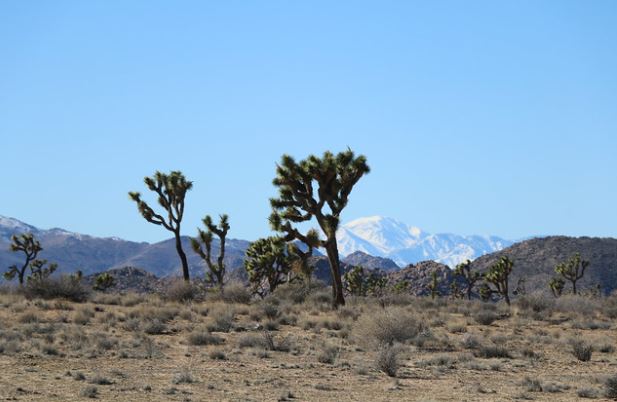
Yucca brevifolia in San Bernardino County, California
Photo by JGilkeson/USFWS, 2017
August 15, 2019 - The U.S. Fish and Wildlife Service has completed in-depth reviews of two species, the Tri-colored blackbird and Joshua tree. For both species, we determined that listing is not warranted.
Ongoing partnerships and management of public and private lands are helping to ensure the long-term conservation of these species.
The Service determined the Tri-colored blackbird does not warrant listing under the Endangered Species Act due to on-going conservation efforts with a number of partners that have enabled the species to remain resilient.
We determined there are two species of Joshua tree - Yucca brevifolia and Yucca jaegeriana; both of which are commonly referred to as Joshua tree. We analyzed both taxa and determined neither species needs protection under the ESA because species distribution mapping shows there has been no major reduction or contraction in Joshua tree populations during the last 40 years. We looked at a variety of factors including: wildfire, drought, and climate change.
A copy of these findings is on public view at the Federal Register, and can be accessed online at: https://s3.amazonaws.com/public-inspection.federalregister.gov/2019-17536.pdf
Source: USFWS
Iconic Joshua Tree Does Not Require Protection Under the Endangered Species Act
August 15, 2019 - Carlsbad, Calif.— The U.S. Fish and Wildlife Service yesterday announced it has thoroughly reviewed the status of the Joshua tree and concluded it does not require protection under the Endangered Species Act (ESA).
The Joshua tree is best known for its presence in Joshua Tree National Park, but it also spans several million acres of high-desert habitat in Arizona, Nevada, Utah and California. Adapted to harsh desert conditions, the trees can tolerate extreme temperatures, ranging from 4 to 120 degrees Fahrenheit and elevations between 1,900 to 7,200 feet.
Through consultation with experts and review of scientific literature, the Service determined that there are two species of Joshua tree, Yucca brevifolia and Yucca jaegeriana. They are both commonly referred to as Joshua tree. The two species are similar in appearance; however, they rely on different species of yucca moth for pollination, and Y. jaegeriana has shorter leaves and is shorter in height than Y. brevifolia.
The Service reviewed the status of both species and assessed the potential impact on their populations of stressors such as wildfire, drought, plant-eating animals, and climate change. The Service’s analysis determined that neither taxa currently requires protection under the ESA.
Most habitat occupied by the two species is federally-managed by agencies including the National Park Service, Bureau of Land Management, U.S. Forest Service and Department of Defense. A much smaller portion of habitat is managed by state or local governments or is privately owned. Species distribution mapping shows there has been no major reduction or contraction in Joshua tree populations during the last 40 years. Additionally, several federal agencies, the states of California and Arizona and several local jurisdictions have adopted and implemented policies that provide some protections to Joshua trees from harvesting and removal.
The Joshua tree finding is available for public view today at the Federal Register, and will officially publish in the Federal Register on August 15, 2019. All documents and supporting information for the 12-month finding will be available at www.regulations.gov. In the search box enter Docket No FWS-R8-ES-2016-0088 and click “search”
Source: USFWS








